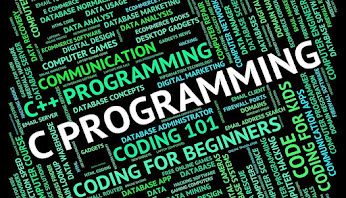In this blogging you know about digital world.
- Get link
- X
- Other Apps
In C, variable names must adhere to certain rules and conventions. Here are some examples of valid and invalid variable names and the reasons why:
In C, variable names must adhere to certain rules and conventions. Here are some examples of valid and invalid variable names and the reasons why:
**Valid Variable Names:**
1. `myVariable`: This is a valid variable name. It consists of letters (both uppercase and lowercase), numbers, and underscores. It starts with a letter.
2. `_count`: This is also a valid variable name. It starts with an underscore and is followed by letters, numbers, or underscores.
3. `MAX_VALUE`: This is a valid variable name. It uses uppercase letters and underscores, which is a common convention for naming constants.
4. `a123`: This is valid as well. It starts with a letter and is followed by numbers.
**Invalid Variable Names:**
1. `123abc`: This is an invalid variable name because it starts with a number. Variable names in C must start with a letter.
2. `my-variable`: Hyphens are not allowed in variable names. Only letters, numbers, and underscores are permitted.
3. `@variable`: Special characters like "@" are not allowed in variable names.
4. `my variable`: Spaces are not allowed in variable names. Variable names must not contain any whitespace characters.
5. `int`: You should avoid using reserved keywords like "int" as variable names.
6. `myVariable!`: Exclamation marks and other special symbols are not allowed in variable names.
Remember that variable names in C are case-sensitive, so `myVariable` and `myvariable` would be considered as two distinct variables. It's also good practice to choose meaningful and descriptive variable names to enhance the readability of your code.
Certainly, let's delve into some equations related to variables in the context of programming, particularly in C.
1. **Assignment Equation**:
- In C, you often use the assignment operator (`=`) to assign a value to a variable. The equation to represent this action is:
variable_name = value;
For example:
int age = 30;
```
2. **Arithmetic Operations**:
- You can perform various arithmetic operations on variables. Here are some equations for common operations:
- Addition: `result = variable1 + variable2;`
- Subtraction: `result = variable1 - variable2;`
- Multiplication: `result = variable1 * variable2;`
- Division: `result = variable1 / variable2;`
- Modulus (remainder): `result = variable1 % variable2;`
3. **Increment and Decrement**:
- You can increment or decrement the value of a variable by 1 using the increment (`++`) and decrement (`--`) operators. These operations can be expressed as equations:
- Increment: `variable++;` or `variable = variable + 1;`
- Decrement: `variable--;` or `variable = variable - 1;`
4. **Compound Assignment**:
- You can perform an operation and assign the result back to the same variable using compound assignment operators. These equations combine an operation and assignment in one step:
- Addition: `variable += value;` (equivalent to `variable = variable + value;`)
- Subtraction: `variable -= value;` (equivalent to `variable = variable - value;`)
- Multiplication: `variable *= value;` (equivalent to `variable = variable * value;`)
- Division: `variable /= value;` (equivalent to `variable = variable / value;`)
- Modulus: `variable %= value;` (equivalent to `variable = variable % value;`
5. **Equality and Comparison**:
- In programming, you often compare variables or expressions. Equations for equality and comparison typically result in Boolean values (true or false):
- Equal to: `result = (variable1 == variable2);`
- Not equal to: `result = (variable1 != variable2);`
- Greater than: `result = (variable1 > variable2);`
- Less than: `result = (variable1 < variable2);`
- Greater than or equal to: `result = (variable1 >= variable2);`
- Less than or equal to: `result = (variable1 <= variable2);`
These equations are fundamental in programming and are used extensively to manipulate and compare variables, control program flow, and perform various calculations.
- Get link
- X
- Other Apps
Comments
Popular Posts
Artificial intelligence
- Get link
- X
- Other Apps
Datatype Programming in C, Data Type
- Get link
- X
- Other Apps
Computer Virus Describe in Hindi
- Get link
- X
- Other Apps
Getting Started C Programming
- Get link
- X
- Other Apps
Decision Control Structure in C, Boolean Operator and Expression
- Get link
- X
- Other Apps
Operators and Expressions in C Programming
- Get link
- X
- Other Apps
Operators in Java
- Get link
- X
- Other Apps













Nice Writing
ReplyDelete